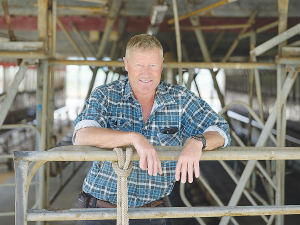Feds power!
OPINION: Your canine crusader reckons no single lobby group has had a bigger turnaround in fortunes than Federated Farmers since the election of the new coalition Government.
 New Northland MP Grant McCallum says it is the job of leaders to take people with them during periods of change and to help cushion the effects on society.
New Northland MP Grant McCallum says it is the job of leaders to take people with them during periods of change and to help cushion the effects on society.
New Northland MP Grant McCallum is calling for cross Parliament consensus on long-term issues like water quality.
Delivering his maiden speech in Parliament last week, the Maungaturoto dairy farmer noted that while change is inevitable, it is the job of leaders to take people with them during periods of change and to help cushion the effects on society.
"As farmers, all we ask for is a clear direction of travel that is achievable while maintaining a profitable business,” he says.
“Having the pendulum swing wildly every time there is a change of government is not good for anyone and is certainly not good for the environment.”
McCallum, a former National Party board member, is an executive of Bluegreens, National’s advisory group on the environment, formed in 1988 by former MPs Simon Upton and Nick Smith.
McCallum noted that the Bluegreens is an excellent forum for debating some very challenging environmental issues.
“It is a forum where all sides of the political and environmental spectrum can meet. It is respectful relationships like this that [we] need to chart a way forward as we work through long term environmental issues.”
McCallum says solutions to environmental challenges lie with Parliament and New Zealand as a whole.
“No single political party or organisation owns the environment, we all do,” he says.
McCallum says dealing with climate change is another challenge facing farmers.
While some see this as too tough and as a pointless battle, McCallum sees it as an opportunity.
He points out that it’s an opportunity to help the world reduce global emissions and increase the value of our exports.
“Let’s back ourselves and our amazing scientists to find solutions. Then, we can add real value to our produce and help secure a future for the next generations both financially and environmentally.”
He also outlined his vision for Northland, the “electorate that is miles above the rest”.
“If ever there is a region that has untapped potential, it is Northland. We are located next to the biggest city in the country, and we have a great coastline and beaches.
“We are blessed with quality soils that can grow a large range of crops. We have one of the highest percentages of young people under 15 in the country, yet we are struggling economically and socially and have done for a long time.”
The single biggest factor holding the electorate back is connectivity, particularly the quality of roading infrastructure.
McCallum says it is best summed up by the state of the Brynderwyrns and the Mangamukas. The Mangamukas has been closed since August 2022 and are expected to be closed for the rest of 2024. The Brynderwyrns were shut for fifty-eight days after the wet weather last summer and are going to be shut for at least another nine weeks to do some urgent repairs, just to try and stop a catastrophic failure this winter.
McCallum says Northlanders have had enough.
“It is time to stop politicising Northland’s roads. It is time all the members of this house release the handbrake on Northland’s prosperity and back the four-lane highway.
“It is a vital part of lifting families out of poverty by enabling businesses to invest, creating jobs and opportunities across a range of sectors and breathing new life into Northland.”
Recent weather events in the Bay of Plenty, Gisborne/Tairawhiti, and Canterbury have been declared a medium-scale adverse event.
DairyNZ's chief executive Campbell Parker says the 2024/25 dairy season reinforces the importance of the dairy sector to New Zealand.
A New Zealand agribusiness helping to turn a long-standing animal welfare and waste issue into a high-value protein stream has won the Australian dairy sector's top innovator award.
OPINION: A bumper season all around.
Dairy Women's Network (DWN) has announced that Taranaki dairy farmer Nicola Bryant will join its Trust Board as an Associate Trustee.
Rural Women New Zealand (RWNZ) says it welcomes the release of a new report into pay equity.
OPINION: Staying with politics, with less than nine months to go before the general elections, there’s confusion in the Labour…
OPINION: Winston Peters' tirade against the free trade deal stitched with India may not be all political posturing by the…